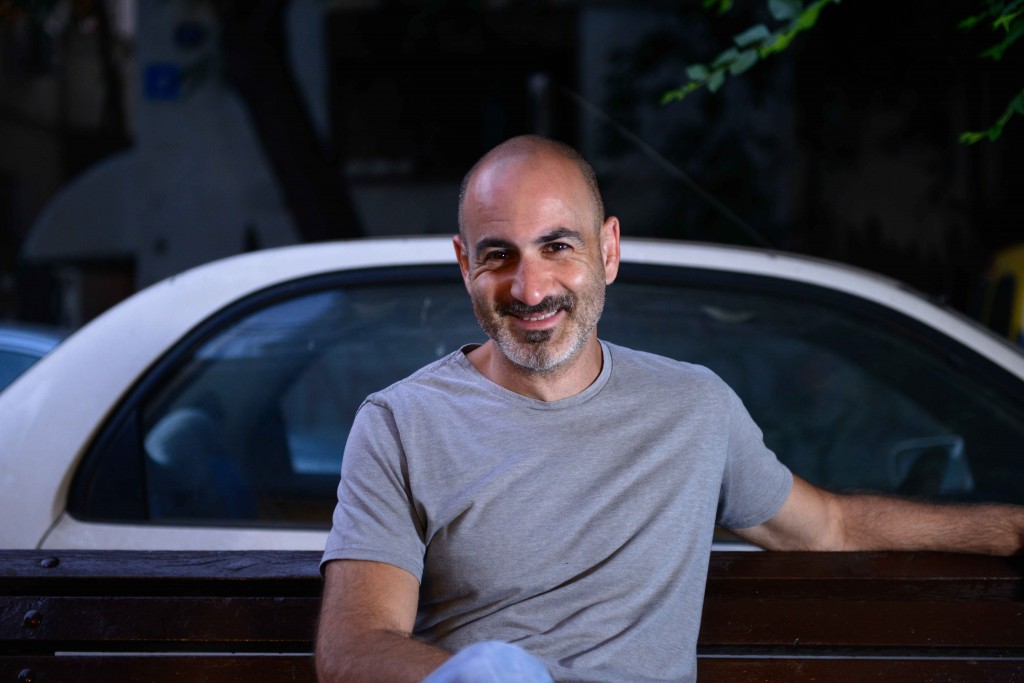The literary voice of a new Israeli generation, Ido Angel offers a radically different look at change, politics, fear, and rebellion—and a special place to get some work done. Ashley Rindsberg interviews him for The Tower Magazine.
Ido Angel is, without doubt, one of the very few Israeli writers whose work is defining—and, to an extent, creating—Israel’s current literary scene. Over the past decade, the 38-year-old Angel has emerged as a distinctive voice. Unlike his predecessors, he doesn’t write about country, war, flags, and guns; but about love, relationships, having children, and growing up.
In this sense, Angel’s work reflects Israel’s own maturation. Today’s generation is turning away from the folk tales and heroes of a newborn country and toward the individual. This individual no longer asks, “What is my country?” as Israel’s early poets did, and not even, “What is my relation to my country?” as the previous generation of writers did. He simply asks, “Who am I?”
Angel’s first book, Michael’s Story, deals with this question through a complex intermingling of characters (including one named “Ido”), narrator, and protagonist; hardly surprising from a novelist who taught narrative structure for seven years at Israel’s Beit Berl College. Michael’s Story was highly praised by Arik Glasner, arguably Israel’s most prominent book critic and certainly one of its most exacting. The precision and careful placement of “the words [of the book] lit up from inside,” Glasner wrote, “like those Japanese paper lanterns.” Those words take on “some of the deepest philosophical questions.”
In his second novel, Children’s Book, Angel explored the connection between creativity and responsibility, and fatherhood and authorship, through the story of a book critic having a child with a female novelist whose work he once reviewed. Written with Angel’s characteristically measured pace and rich Hebrew vocabulary, the book, wrote Haaretz’s Ilit Karp, “manages to instill in the reader’s heart empathy for the fate of [these] two people.”
Angel is not only a reflection or representation of his generation; he is also very much a part of it. He is the founder and manager of Misanthrope, Tel Aviv’s most successful shared work space; a place writers and students can go and, for a minimal fee, do their work without distractions. Angel is also the creator (and former director, editor, and writer) of the 3-D animated children’s series, Vipo: Adventures of the Flying Dog, which has been translated into 50 languages and broadcast in 100 countries. He has the struggling, enterprising, make-it-happen personality that is such a distinct part of the modern Israeli persona, but is rarely found among writers, who rely on navel gazing for their livelihood.
The following interview with Angel, which took place outside Misanthrope, takes the temperature of Israel today—on the street and in the books of its emerging generation of writers.
AR: Let’s begin with the ending. A few years ago, readers in America and Europe knew Israeli writers for their work. Today, Israeli writers seem better known for their political involvement. I’m thinking of people like David Grossman, Amos Oz, and A.B. Yehoshua. Do you think your generation of Israeli writers still has a political role to play?
Ido: It’s an interesting question. It’s hard to answer, because you need to define what political means. Everything is political. Even if you write about your kids, it’s politics. So the political vibe, writing from a political view, is there. It’s out there. If it diminishes the way people write, the way people read, or the way people are interested in young Israeli writers—I don’t know. I think it did shift from just being about politics to other places.
AR: To what?
Ido: To everything. I think we’re fed up with something very big: The way the old generation is running things. And that’s political. It involves the way we raise our children. The way we talk to each other. The stuff we’re interested in. The way we treat sex. Everything. We’re fed up with the way things are run. And it’s a sort of responsibility to change it.
AR: What’s the difference, though? If you were sitting next to a fictional representative of the previous generation, what would you see? What would you say?
Ido: It’s on a few levels. The previous generation was fed up with its previous generation. And that older generation was just telling our parents’ generation what to do. I think about my mother. She didn’t know the stuff that was done to her was bad. She didn’t know that the way her father and her mother were treating her was bad. It was okay because it was her father and her mother.
Then came the ’60s and someone told her, “Listen, this is s**t. This is horrible, the things that they’ve done to you, and the way you were raised.” I think that’s very confusing. And I think we’re suffering from it. The fruits of this confusion were passed onto us.
I think the previous generation is very egotistical, in a way. And they have every right to be, because they had their egos squashed. They have every right to be egotistical. But that doesn’t mean they have the right to have children. [He laughs.]
AR: That brings us to your most recent novel, Children’s Book, which is not a children’s book at all. What’s it actually about?
Ido: It’s writing about two things. In the foreground, it’s just about my own fears of relationships, of the constraints of relationships, which are very clear when there’s a child around. And in the background, it’s writing from this sense of political responsibility: That you have to change something. The change is just to say that we’re scared—and not just be scared—and then be scared of being scared. You have to say that you’re scared. It’s scary to be with someone. It’s scary to plan a future with someone when you yourself are just a child.
Avram Heffner, who is one of my favorite writers, asks in one of his books: Who does the literary love, the love in literature—like the love of Romeo for Juliet— belong to? Is it Shakespeare’s love for his wife? No. He probably hated her and they lived apart. Is it just the ideal of love? No, because what the f**k is that?
Heffner comes up with the answer that it’s the love the deserted child has for his mother. You’re five years old and you want your mother to pick you up. But she’s three. She’s still a child herself. And we’re still trying to figure out who we are—even now that I’m 40—just like when we were in high school. Just like you asked me, “Who am I?” And I have to be a father. It’s crazy.
AR: Speaking of writers, who influences you?
Ido: Among Israeli writers, Avram Heffner definitely, and Yaakov Shabtai definitely. And I’m not even counting them as Israeli writers. They’re just amazing writers on an international scale. They’ve both done things that, if this country weren’t so small and the language so inaccessible to others, they would be among the greats.
Non-Hebrew writers would be Borges. And I love Natalia Ginzburg. Though she’s not really a big influence, I really like her books. And there’s Catherine Harrison. And I also have to add Hanoch Levin, who’s also—wow—one of the greats. The world is just really missing something by not knowing him, because he could never be translated.
AR: So you think it’s the language more than the market that’s the reason Israeli writers don’t get translated?
Ido: It’s not just the language. It’s the size. We’re just a small country. The percentage of people who make it anywhere is low. Even in the US.
AR: There was the previous generation when you had the group of big Israeli writers, but today there isn’t one.
Ido: That’s true, but there weren’t so many Israeli writers back then. And today there’s more.
AR: Meaning?
Ido: Meaning now there are more books being published, so there are more writers and writing is more accessible to people. And it didn’t used to be that way, because not that many people got an education and people were busy working really hard. Now they’re busy writing and protesting. And sitting in coffee shops.
AR: So, you’re saying the ones who made it before had to work harder?
Ido: Yes. But great things are happening in Israeli literature. It’s the post-modern shift. A few years ago a writer was a writer. Amoz Oz was a writer. That’s what he did. Today a writer is a waitress. Or a copy writer. Or running a business, like Misanthrope.
AR: Do you think that’s to the benefit or the detriment of literature?
Ido: Not so much to the benefit. But there are benefits to it. If the knowledge and the freedom that we have today to use language, the freedom to think, and the political responsibility that we have today, had existed just 40 or 50 years ago than literature would have been amazing. It would have been great.
Then again, if we had the focus and the discipline and, to some extent, the modesty that people used to have, that would be great too.
AR: So, you think there are great things going on in today’s Israeli literature?
Ido: There are. In poetry, one of my favorite poets of this generation is Shimon Adaf. I think he published a book called Aviva – Lo, which is an amazing book. What he does there combining biblical Hebrew and street Hebrew is amazing.
And there are also very nice books like those by Noga Albalach, who published a novella and then developed it into a novel [called The Push]. It’s great. Really great writing. Very modest and full of expression. Yes, there’s very good things. And then a lot of s**t. So much crap.
AR: What’s the crap? Not naming names, but what does the crap have in common with itself?
Ido: The crap is just trying to be someone else. And the crappiest crap is trying to be someone else who is trying to be himself. That is the most concentrated crap there is. It’s someone saying to himself, “Okay, I’ll try be someone else and that guy will be special.”
“The change is just to say that we’re scared—and not just be scared… You have to say that you’re scared. It’s scary to be with someone. It’s scary to plan a future with someone when you yourself are just a child.”
AR: And what about American writers. Do you read them?
Ido: I read Jonathan Safran Foer. It was nice. It was a nice read.
AR: Which book?
Ido: Everything Is Illuminated. But I have to say that I’m too ignorant to answer this. And maybe I’m not just ignorant, because I’m saying, “f**k everything.” But it’s more that I don’t just read writers or even just read a book. I’m not reading to enjoy a book, but to learn something. So sometimes half a book is enough, or even a paragraph.
AR: What about the classics?
Ido: Borges is classic and still relevant. He will be relevant forever. But I think among the heavy classics, the things that stick with me are the unpublished or less-known books. Like there’s a lesser-known book of Dostoevsky’s, The Double, which is an amazing book. And then you read The Idiot and it’s somehow not relevant anymore.
AR: What about your role here at Misanthrope. In my mind it’s an innovation. How does it fit into your life? Why did you call it Misanthrope?
Ido: It’s weird that you think about it as an innovation. I just needed the place, so I opened it. I needed the space to write. I couldn’t stand coffee shops because of the noise and the prices. And I couldn’t write at home. It just doesn’t work. I didn’t open it to become a millionaire; and I’m sticking to that plan, unfortunately.
It’s just a place where people can pay the minimum amount necessary [to come and study or work]. But it’s really for myself. And maybe that’s why it’s called Misanthrope, because f**k everyone else. It just gives a guy or a girl a place where they can be misanthropes for a few hours and say, “f**k everyone else.”
AR: Can you imagine an ideal place to write?
Ido: Oh, this place. Completely. This is the ideal. The only thing missing here is a safe with a lot of money in it. Then it would be amazing. If you could write with no financial worries that would be amazing. I don’t write for my poverty.
AR: What are you working on now?
Ido: A TV show called Bummed Out about a single father with a young son who’s a bit feminine. The character, who’s basically me, is kind of just hanging around. At night he sneaks into his kid’s room and scrubs the nail polish off his fingers.
AR: Why do you think Israel has become so good at exporting its culture? I’m referring to shows like B’tipul, which became HBO’s In Treatment, and Hatufim, which was transformed into the hit Showtime series Homeland.
Ido: There’s this small area, the Middle East, and in the center of it is Israel—really at the center. Maybe that’s related, because it’s the center of religion. Everything just spread out from here. All these people believe that something started here. It’s a big thing, this place. That’s why everything is like a barrel of explosives and it’s interesting to people.
AR: But how does that connect to a series like In Treatment?
Ido: Everything that’s made here is made under this halo of interest, because it’s here, because it’s in Israel. I didn’t see many episodes of B’Tipul, but everything in Israel is non-professional—even your therapist. And that came through in the series. That the relationship is not as professional as it seems.
AR: Blurring lines.
Ido: Yeah, blurring the lines.
AR: Which is like Homeland as well.
Ido: And something they tried to do in The Sopranos, in the beginning. But there it was not just a person and a person, but a therapist and a criminal. So it was more condensed, more specific. But here in Israel, we’re just two people. And that’s something that’s very Israeli, to say we’re just two people.
AR: People don’t play their roles in Israel. In the US, when you’re a bank teller, you’re a bank teller. When you’re a customer, you’re a customer. Here in Israel you can be the prime minister or you can be the guy sweeping the street and the interaction is going to be the same.
Ido: Yeah. I remember when I was in the army, I was on base and I was dating someone. We were having an argument and I was standing up against a wall, and she was standing in front of me with the stairs behind her. And then the commander of the whole brigade walked up behind her and I immediately saluted because you have to. And she just looked back and said, “Oh, it’s you.” That’s it. It’s so Israeli. I was just a scared soldier, but for her it was just a person walking up the stairs, like “Why should I salute you?”
![]()
Banner Photo: Aviram Valdman / The Tower









